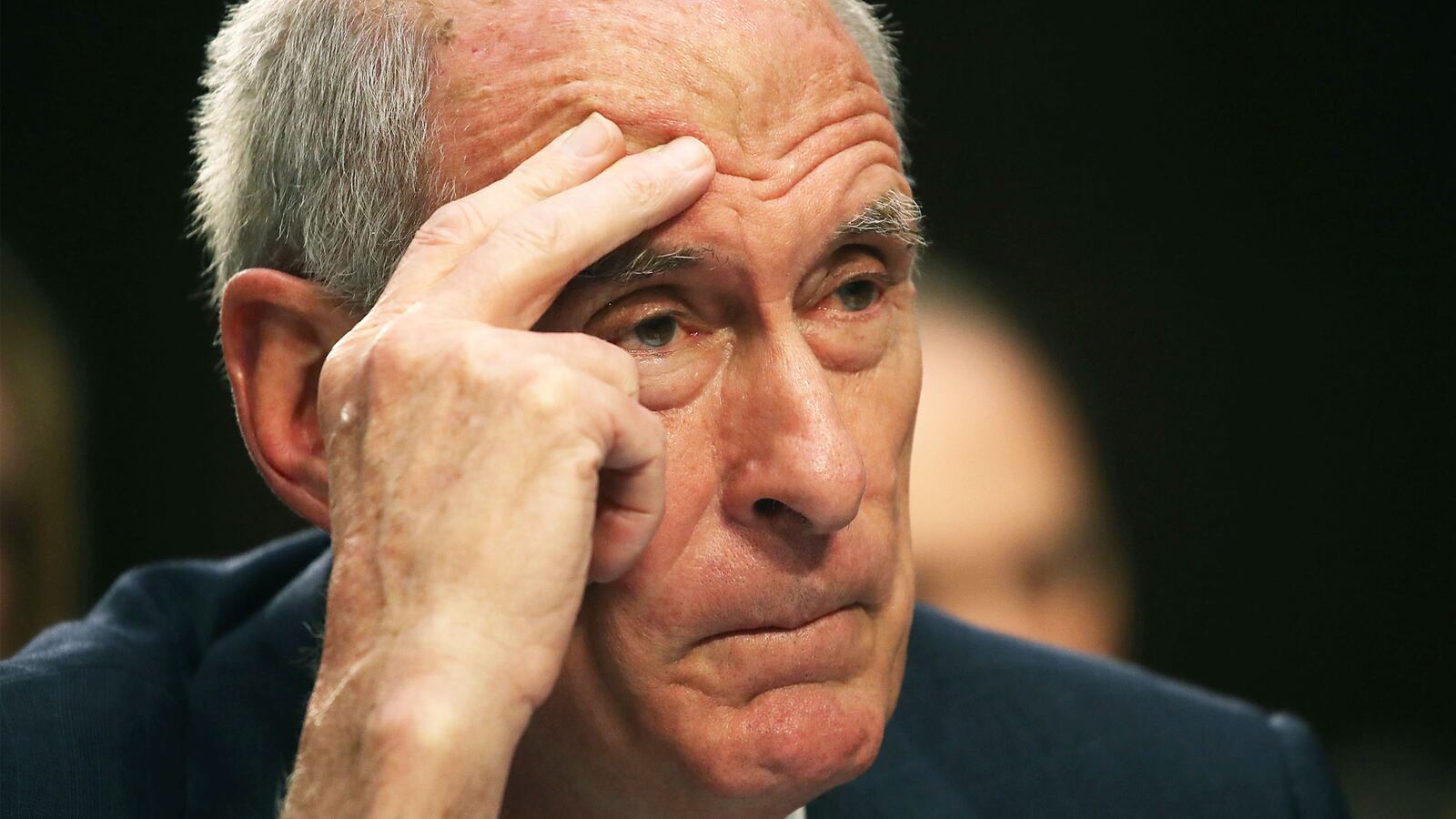ASPEN, Colo. – The U.S. Director of National Intelligence learned Vladimir Putin would be visiting the White House, via a tweet read to him at the Aspen Security Forum.
“Say that again?” Dan Coats said to moderator Andrea Mitchell, to the laughter of the crowd of assembled national security experts. “Okay...— That’s gonna be special.”
The head of the U.S. intelligence agencies had already admitted that the president often surprised him. He said he didn’t know the content of the conversation between Russian President Putin and President Donald Trump at the Helsinki summit—and that if asked, he would have suggested against such a high-risk meeting, with the former head of Russia’s KGB meeting a foreign policy neophyte with only a translator as witness.
The intel chief said he’d suggest a different format this time around, especially after the damaging reports that emerged from the Russian side the last time two senior Russian officials were allowed into the Oval Office, which Coats said was “probably not the best thing to do.” He blamed the misstep on the inexperience of a commander in chief “who came from the outside,” adding that he didn’t think it was “nefarious” and wasn’t aware of anything similar happening since.
The post-Helsinki-summit presser has produced continuing fallout, with Trump taking a day before reluctantly reversing his public acceptance of Putin’s “strong” denials of interference in the 2016 U.S. elections. The president’s initial endorsement of Putin’s denials had prompted Coats to issue an extraordinary a public correction, asserting that the U.S. intelligence community still believed Russia attempted to interfere—a conclusion Trump took almost a week to fully articulate publicly.
“I was just doing my job,” Coats said of what amounted to a public upbraiding of a sitting president. “As I expressed to the president on my third visit to the Oval Office… there will be times when I have to bring you news you don’t want to hear.”
Coats said he was satisfied that Trump had since corrected the record, but that the exchange had unsettled European allies unsure that Trump understands the Russian threat.
“It was an awful idea to start with and now I’m really frightened,” said a senior European official of Trump’s Helsinki summit performance. “I think it just undermined NATO, it’s damaging for the U.S.-European relationship. It’s time to push back, but it’s very difficult—how do we do that on the European side when we need the U.S. as an ally,” the official said.
Other allies are more sanguine.
“We fully support interaction, conversation and engagement,” said another senior European official of the ongoing Trump-Putin rapprochement. “It’s in nobody’s interest for U.S. and Russia to have no functioning dialogue.”
But that dialogue has to include a degree of verbal and actual pushback, like the expulsion of 60 Russia diplomats over the nerve agent poisoning of a former Russian intelligence officer and his daughter in Britain, the official said. Both officials spoke anonymously because they were not authorized to speak publicly—and did not want to offend the White House.
“We have seen a pattern of Russian behavior that’s only gotten worse,” she said. “Our view of how we should engage with somebody like Putin is to be clear where Russia’s actions are causing problems and clear about activity that is unacceptable and be clear that we will respond to Russia’s threats… and focus on where we can cooperate.”
And Russia continues to meddle, said Coats, who nixed Trump’s notion that 2016 U.S. election meddling might have been carried out by others. “It’s undeniable that the Russians are taking the lead on this… trying to wreak havoc with our election process,” he said.
It’s not clear Russia is planning something as large scale in 2018, he said, echoing earlier comments at the annual forum by Homeland Security Secretary Kirstjen Nielsen. But he said that could change quickly, adding that detection of a Russian oligarch’s involvement in the Maryland election system as proof counterintelligence efforts against Moscow are working.
On North Korea’s intent to actually denuclearize, Coats said he’s a “trust but verify” kind of guy, and that his job was to catch Pyongyang trying to hide its program—something he said they’d fully expected—and verify if or when it was following through. He added that he wasn’t certain it could be done in a year, despite that optimistic prediction by National Security Adviser John Bolton.
Of the occasional barbs that come the intelligence community’s way from the Oval Office, Coats said he tells his team, “We need to keep our heads down…. There’s a lot of political swirl going around. Just do your job.”
Of the upcoming visit he’d learned about while on stage, Coats said the intelligence community would try to assess the risks of an Oval Office visit, and provide that unvarnished information to Trump as well. He said Russian and U.S. intelligence currently maintained a professional relationship, sharing only intelligence of imminent harm to either side.
Those assurances may do little to quell unease in some European capitals over the growing Trump-Putin bromance.
“What is Putin’s takeaway from the Helsinki summit? He pretty much got away with everything,” the first senior European official said. “I don’t think Russia will launch a war but Putin will see what else he could get away with.”
This time, he’ll be seeing how much he can get while within the Oval Office.






